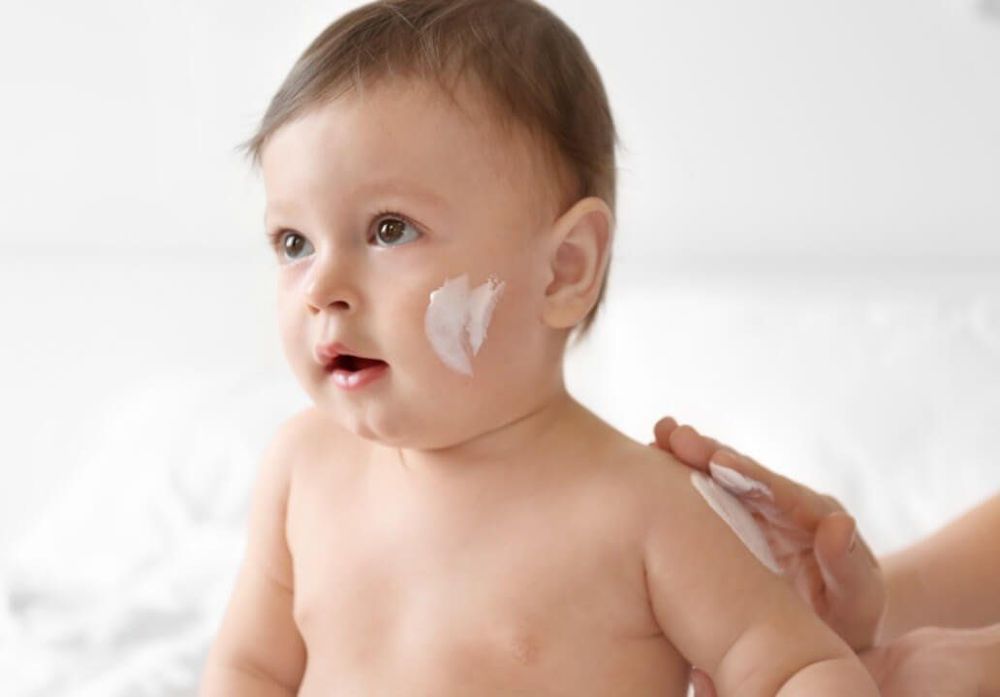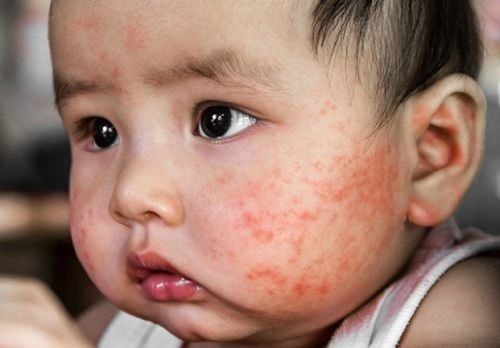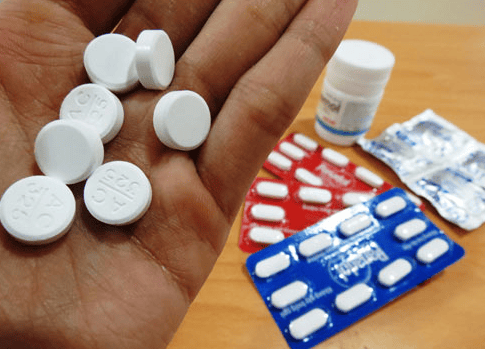This is an automatically translated article.
The article is professionally consulted by Master, Doctor Nguyen Minh Tuan - Pediatrician - Department of Pediatrics - Neonatology - Vinmec Danang International General Hospital.Baby eczema, also known as strabismus, is a common disease in infants and young children, especially children under 1 year of age. To effectively treat baby eczema, parents need to understand the cause of the disease and pay attention to the problems in child care.
Baby eczema is a chronic inflammatory skin condition that is not contagious. If the disease recurs many times, it can become atopic eczema, so eczema is also considered the first stage of atopic eczema.
1. Causes of baby eczema
The cause of baby eczema is still not clear and certain, but the disease is common in children with atopy. In addition, if the parents have asthma, weather allergies, urticaria, skin allergies, etc., the children are also susceptible to the disease. Usually, eczema will gradually decrease and recede by the time the child is over 1 year old.The cause of baby eczema is related to a combination of two factors, that is, atopic and allergens.
Allergens can be from changes in metabolism inside and outside the body such as: pet dander, dust, mold, dust, digestive disorders, food (milk, eggs .. .), how to breastfeed, infected children...
In addition, factors that stimulate and aggravate eczema in children include: Dry, hot, humid weather; bath soap, laundry; bleach, cloth, cigarette smoke...
Trắc nghiệm: các chỉ số cần chú ý về sự phát triển thể chất của trẻ
Chiều cao, cân nặng của bé ở từng giai đoạn nên là bao nhiêu là bình thường, bao nhiêu là bất thường? Cùng ThS.BS Ma Văn Thấm điểm lại xem bạn đã nắm được các chỉ số phát triển thể chất của bé chưa nhé!The following content is prepared under supervision of Thạc sĩ, Bác sĩ y khoa, Ma Văn Thấm , Nhi , Phòng khám Đa khoa Quốc tế Vinmec Dương Đông(Phú Quốc)
2. Signs to recognize baby eczema
Baby eczema is common in children from 6 months old, appearing on the face, cheeks and can spread to the whole body, hands and feet... Initially, eczema is just red spots, then It forms tiny, red blisters that crack and ooze, crust over, and then peel off. In areas where the skin is crossed, when touched, it will feel rough and have tiny scales, dry and tight skin. These red, dry patches often appear on the face and in areas where the skin is folded, such as the neck, elbows, backs of the hands, wrists, behind the knees, and ankles. In addition, children may also experience additional allergic signs of asthma or rhinitis. When the milk is crossed, the baby will be very upset, fussy, suck, and sleep poorly. The itchy areas cause the child to fidget and scratch constantly, which can cause the blisters to burst, causing bleeding. Without good hygiene, the damaged skin can easily become infected (or superinfected), making it difficult to treat, and leave scars and affect aesthetics later.
3. Treatment of baby eczema
Baby eczema is a disease that is easy to recur due to allergies when eating or changing weather. The purpose of treatment is to normalize the skin and prolong the healing time to limit the recurrence of the disease, because the disease is difficult to treat completely. Therefore, children with acute eczema need to limit their exposure to sources of the disease.Besides, it is necessary to take care of baby's skin with special products to help improve baby's skin. Parents should consult a doctor to be able to use skin care products or topical medications with appropriate and safe doses. Parents absolutely should not buy topical medicine for children, or follow folk remedies because it can make baby eczema worse.
Some skin care creams that can be used for babies include Ceradan or Dexeryl...
4. Prevention of baby eczema
Prevention of baby eczema is based on factors: nutrition, skin hygiene of children and surrounding living environment. Specifically:Nutrition: For infants and young children who need to maintain breast milk as long as possible, they should only be given solid foods from 6 months onwards. Avoid giving children allergenic foods such as eggs, seafood, peanuts, fermented foods...
Child's body hygiene: Do not let children bathe for too long with soap or shower gel. Warm water to reduce the itching caused by baby eczema, causing the child to scratch will easily infect the skin.
Should use baby shower gels. Avoid wearing clothes made of wool or synthetic fibers, which do not absorb sweat and clog the skin. Children should be dressed in soft clothes. Keep baby's skin dry and airy.
Ambient: Do not change the room temperature too quickly. Regularly pay attention to cleaning the house, especially the sleeping place of the child. The baby's place should be ventilated with the necessary humidity. Limit children's contact with pets such as dogs and cats.

5. What should children with eczema avoid eating?
For children who are still breastfed, if the child has crossed milk, the mother should limit some of the following foods so as not to affect the mother's milk supply for the baby:
Fishy foods: Shrimp, crab, fish , even algae should not be eaten. These are foods that have a high ability to stimulate an immune response, also known as an allergy. If the mother eats the above foods, they will pass into the breast milk, the nursing baby and can trigger the allergic chain; High-fat foods: Such as fatty meat, greasy fried foods... When eating a lot of high-fat foods, it will easily trigger allergies, eczema in children, and more nodules; Foods rich in spicy and numbing substances: Like chili, lemon, pepper. Basically, these are strong digestive stimulants, however, they are easy to cause itching and stimulate sweating, making children with crossed milk will be worse. As long as the mother eats a certain amount of strong spicy food, the breast milk will become hotter than usual and affect the baby. Eczema in children is a common disease, so parents should pay attention to the signs to take care of their children properly, in case of severe and persistent eczema, parents should take their children to see a dermatologist. Check and treat because this is most likely a manifestation of some other dangerous disease.
Pediatrics Department at Vinmec is one of the few hospitals with a full range of specialists in dermatology, respiratory, neurology, gastroenterology, nutrition,... right at the Pediatrics department. Therefore, when your baby has eczema, the doctor here will receive more intensive and effective treatment, without having to spend too much time traveling between departments. The medical team is well-trained, in-depth, highly qualified, experienced, regularly participates in major seminars from the world's leading medical experts, bringing to patients new, most effective treatment options, shortening treatment time.
In addition, the Pediatrics Department at Vinmec has a separate children's play area full of all indoor and outdoor activities, helping children to feel comfortable when coming for examination and treatment. Space designed airy, in harmony with nature, clean environment to help protect the baby's health best.
If you have a need for examination and treatment at Vinmec, please book an appointment directly at the website or contact the hotline for service.
Please dial HOTLINE for more information or register for an appointment HERE. Download MyVinmec app to make appointments faster and to manage your bookings easily.















